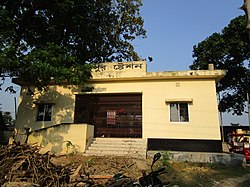Biral (Bengali: বিরল) is an upazila of Dinajpur District[3] in the Division of Rangpur, Bangladesh.
Biral
বিরল | |
|---|---|
 Mangolpur Railway Station | |
 | |
| Coordinates: 25°38′N 88°32′E / 25.633°N 88.533°E | |
| Country | |
| Division | Rangpur |
| District | Dinajpur |
| Area | |
• Total | 353.98 km2 (136.67 sq mi) |
| Population | |
• Total | 281,554 |
| • Density | 800/km2 (2,100/sq mi) |
| Time zone | UTC+6 (BST) |
| Postal code | 5210[2] |
| Website | Official Map of Biral |
Geography
editBiral is located at 25°38′00″N 88°32′00″E / 25.6333°N 88.5333°E. It has 61,414 households and total area 353.98 km2.
Biral Upazila is bounded by Bochaganj and Kaharole Upazilas on the north, Dinajpur Sadar Upazila and Punarbhaba River on the east, Dinajpur Sadar Upazila and Gangarampur and Kushmandi CD Blocks in Dakshin Dinajpur district, West Bengal, India, on the south, and Bochaganj Upazila, Kaliaganj CD Block in Uttar Dinajpur district in West Bengal, India and Kushmandi on the west.[4][5][6]
Demographics
editAccording to the 2011 Census of Bangladesh, Biral Upazila had 61,414 households and a population of 257,925. 59,186 (22.95%) were under 10 years of age. Biral had a literacy rate (age 7 and over) of 47.33%, compared to the national average of 51.8%, and a sex ratio of 982 females per 1000 males. 9,059 (3.51%) lived in urban areas.[8] Ethnic population was 4,178 (1.62%), of which Santal were 3,257.[9]
As of the 1991 Bangladesh census, Biral has a population of 2,04,420. Males constitute 52.57% of the population, and females 47.43%. This Upazila's population above 18 years is 101819. Biral has an average literacy rate of 27.9% (7+ years), and the national average of 32.4%.[10]
Administration
editBiral Thana was formed in 1915 and it was turned into an upazila in 1984.[12]
Biral Upazila is divided into ten union parishads: Azimpur, Bhandra, Biral, Bijora, Dhamoir, Dharmapur, Farakkabad, Mangalpur, Ranipukur, and Shohorgram. The union parishads are subdivided into 241 mauzas and 238 villages.[8]
See also
editReferences
edit- ^ National Report (PDF). Population and Housing Census 2022. Vol. 1. Dhaka: Bangladesh Bureau of Statistics. November 2023. p. 403. ISBN 978-9844752016.
- ^ "Bangladesh Postal Code". Dhaka: Bangladesh Postal Department under the Department of Posts and Telecommunications of the Ministry of Posts, Telecommunications and Information Technology of the People's Republic of Bangladesh. 21 October 2024.
- ^ Md. Mizanur Rahman, "Biral Upazila", in Sirajul Islam (ed.), Banglapedia: National Encyclopedia of Bangladesh, Asiatic Society of Bangladesh
- ^ "Biral Upazila". Banglapedia. Retrieved 8 December 2018.
- ^ "District Census Handbook 2011 Dakshin Dinajpur" (PDF). Map of Dakshin Dinajpur showing CD Blocks on the fourth page. Directorate of Census Operations. Retrieved 8 December 2018.
- ^ "District Human Development Report". Uttar Dinajpur. Page 14: Map showing locational setting of Uttar Dinajpur district (includes Dakshin Dinajpur district). Department of Planning, Statistics and Programme Implementation, Government of West Bengal. Archived from the original on 19 January 2018. Retrieved 8 December 2018.
- ^ Population and Housing Census 2022 - District Report: Dinajpur (PDF). District Series. Dhaka: Bangladesh Bureau of Statistics. June 2024. ISBN 978-984-475-270-2.
- ^ a b "Bangladesh Population and Housing Census 2011 Zila Report – Dinajpur" (PDF). bbs.gov.bd. Bangladesh Bureau of Statistics.
- ^ "Community Tables: Dinajpur district" (PDF). bbs.gov.bd. Bangladesh Bureau of Statistics. 2011.
- ^ "Population Census Wing, BBS". Archived from the original on 2005-03-27. Retrieved November 10, 2006.
- ^ উপজেলা নির্বাহী অফিসার. 2024-08-27. Archived from the original on 2024-08-27.
- ^ "Biral Upazila - Banglapedia". en.banglapedia.org. Retrieved 2023-02-20.